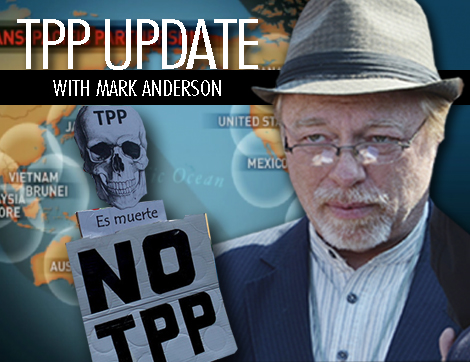
The massive 12-nation, largely secret, free-trade deal known as the Trans-Pacific Partnership is expected to be voted upon by Congress during the lame-duck session just after the Nov. 8 general election. Now is the time to renew or start steady calls and letters to Congress. Call 202-224-3121 or 225-3121 and tell your elected officials to oppose TPP.
By Mark Anderson
Even the free-trading New York Times has conceded that the U.S. has a stratospheric annual manufacturing trade deficit of around $800 billion, and that trade deficit is widely expected to worsen if the pending 12-nation Trans-Pacific Partnership (TPP) free-trade and investment treaty becomes law. Fair, rational, balanced trade will never get a chance to emerge—unless the American people get some traction and disallow final congressional approval of the TPP.
Congress is likely to take up TPP during the lame-duck time “gap” when Capitol Hill shenanigans often intensify, since the pre-election government still operates through the rest of November, much of December, and a couple weeks into January until a new Congress and new president are seated.
Emigrate While You Still Can! Learn More . . .
Given that situation, newly elected and re-elected officials feel rather “bulletproof” from voter opinion, since any Congress members voted out of office on Nov. 8 no longer fear public blowback, and the re-elected ones are relieved the election has passed. It’s seen as too politically costly to vote on the TPP before Nov. 8. Still, Congress must be watched daily at this point.
President Obama, having served his two terms, would love to add the TPP to his “legacy” list, which includes the Obamacare health-insurance scheme, the Iran nuclear deal, and a record-breaking 10-year, $38 billion aid package to Israel.
Recall that highly controversial votes in Congress have often been carried out around the holidays when voters and even many in Congress are sidetracked. The worst institutional pirate of all time, the private Federal Reserve central bank, was long ago given the “keys to the kingdom”—the concession to control and issue the nation’s money supply—when the Federal Reserve Act was passed two days before Christmas, on Dec. 23, 1913.
A little encouragement: As AFP recently reported, another trade scheme, the Transatlantic Trade and Investment Partnership (TTIP)—a U.S. trade treaty with the 28-member European Union—is encountering populist pushback in Germany and France. While it’s also worthy of congressional disapproval, it’s not as imminent as TPP.
AFP readers need to treat the defeat of TPP like a mission, akin to ending the Federal Reserve. This defeat would severely weaken TTIP support in Congress and cast doubt on the whole spectrum of trade treaties that are slyly redefined as “partnerships” so the Senate’s constitutional trade-review duties aren’t activated.
A news bulletin from the Coalition for a Prosperous America (CPA), a Washington-based non-profit, non-partisan lobbying outfit, noted that, under existing free-trade pacts such as NAFTA, “Highly competitive manufacturing companies have been lost. Millions of jobs have been destroyed. Our agricultural trade surplus has been eroding. Communities have been hollowed out. The TPP will make these problems worse.”
The CPA added: “Trade negotiators have refused to address the biggest causes of the trade deficits in trade deals. Instead they negotiate trade deals with a hodge-podge of special-interest tariff cuts, regulatory changes and sovereignty giveaways. Congress has failed to set a national goal to fix the trade deficit.”
THE CRUCIAL WTO FACTOR
The fundamental entity behind the TPP, TTIP et al. is the World Trade Organization (WTO). Congress approved WTO membership with its lame-duck December 1994 GATT-WTO vote, which made the U.S. one of the WTO’s charter members.
Economy in Crisis, an Ohio-based non-profit corporation concerned about the depletion of the U.S. industrial base, noted on its website, “By signing the agreement with the World Trade Organization . . . Congress agreed to concede a major portion of our sovereignty. . . .”
That giveaway includes, according to Economy in Crisis:
- Conforming U.S. laws, regulations, and administrative procedures to the WTO.
- Subjecting all federal, state, and local laws and practices that affect trade to WTO reviews.
- Allowing any WTO member country to challenge U.S. federal, state, and local laws and practices as trade-impeding.
- Taking all trade disputes to the WTO judiciary, giving the WTO final jurisdiction over all trade altercations. No appeal exists outside of the WTO.
- Empowering the WTO to enforce its rulings by imposing fines on the U.S.
- Disallowing Congress to change the agreement.
The WTO is a descendant of the trade regime set up at the Bretton Woods, N.H. conference in 1944. All told, leaving the WTO would be the ideal goal, since WTO membership is a cornerstone of further economic treachery via TPP, TTIP, and similar pacts.
Mark Anderson lives in Michigan and is AFP’s roving editor.

